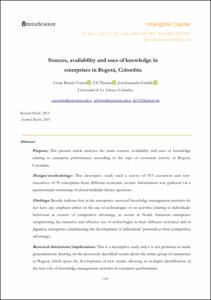Mostra el registre d'ítem simple
Sources, availability and uses of knowledge in enterprises in Bogotá, Colombia
| dc.contributor.author | Bernal-Torres, Cesar |
| dc.contributor.author | Thoene, Ulf |
| dc.contributor.author | Giraldo, José |
| dc.date.accessioned | 2016-06-10T11:48:49Z |
| dc.date.available | 2016-06-10T11:48:49Z |
| dc.date.issued | 2016-06 |
| dc.identifier.citation | Bernal-Torres, Cesar; Thoene, Ulf; Giraldo, José. Sources, availability and uses of knowledge in enterprises in Bogotá, Colombia. "Intangible Capital", Juny 2016, vol. 12, núm. 2, p. 733-754. |
| dc.identifier.issn | 1697-9818 |
| dc.identifier.uri | http://hdl.handle.net/2117/87889 |
| dc.description.abstract | Purpose: The present article aims to analyse the main sources, availability, and uses of knowledge relating to enterprise performance in Bogotá, Colombia. Design/methodology/approach: This exploratory descriptive study used a survey of 919 executives and non-executives of 59 enterprises from different economic sectors in Bogotá. Information was gathered via a questionnaire elaborated by the researchers consisting of 11 closed multiple-choice questions. Findings: Results indicate that in the participant enterprises knowledge management activities do not have any emphasis either on the use of technologies or on activities relating to individuals’ behaviour as sources of competitive advantage, as occurs in North American enterprises (emphasising the intensive and effective use of technologies in their different activities), and in Japanese enterprises (emphasising the development of individuals’ potential as their competitive advantage). Research limitations/implications: It is an exploratory and descriptive study from which it is not pertinent to make generalisations of the previously described results about the whole group of enterprises in Bogotá motivating the development of new studies that allow the in-depth identification of the true role of knowledge management activities in enterprise performance. Practical implications: Contributes to the empirical knowledge of business reality and to the need for designing strategies allowing a better use of knowledge management to improve the competitive capacities of enterprises. Social implications: Contributes to the reflection on the importance of the essential differences providing sustainable competitive advantages to nations, organisations, and individuals over prolonged periods of time understanding knowledge as the strategic resource of contemporary society. Developing countries require best practices in the identification, transfer, spread, and use of knowledge management. Originality/value: Compares the theory on knowledge management with the empirical evidence of what really happens internally in enterprises in developing countries with respect to knowledge management activities as a competitive strategy. |
| dc.format.extent | 22 p. |
| dc.language.iso | eng |
| dc.publisher | OmniaScience |
| dc.rights | Attribution 3.0 Spain |
| dc.rights.uri | http://creativecommons.org/licenses/by/3.0/es/ |
| dc.subject | Àrees temàtiques de la UPC::Economia i organització d'empreses::Gestió del coneixement |
| dc.subject.lcsh | Knowledge management -- Colombia |
| dc.subject.other | Knowledge sources |
| dc.subject.other | Knowledge availability |
| dc.subject.other | Knowledge uses |
| dc.subject.other | Competitive advantage |
| dc.subject.other | Knowledge management |
| dc.title | Sources, availability and uses of knowledge in enterprises in Bogotá, Colombia |
| dc.type | Article |
| dc.subject.lemac | gestió del coneixement -- Colòmbia |
| dc.identifier.doi | 10.3926/ic.626 |
| dc.identifier.dl | B-33375-2004 |
| dc.description.peerreviewed | Peer Reviewed |
| dc.rights.access | Open Access |
| local.citation.publicationName | Intangible Capital |
| local.citation.volume | 12 |
| local.citation.number | 2 |
| local.citation.startingPage | 733 |
| local.citation.endingPage | 754 |


